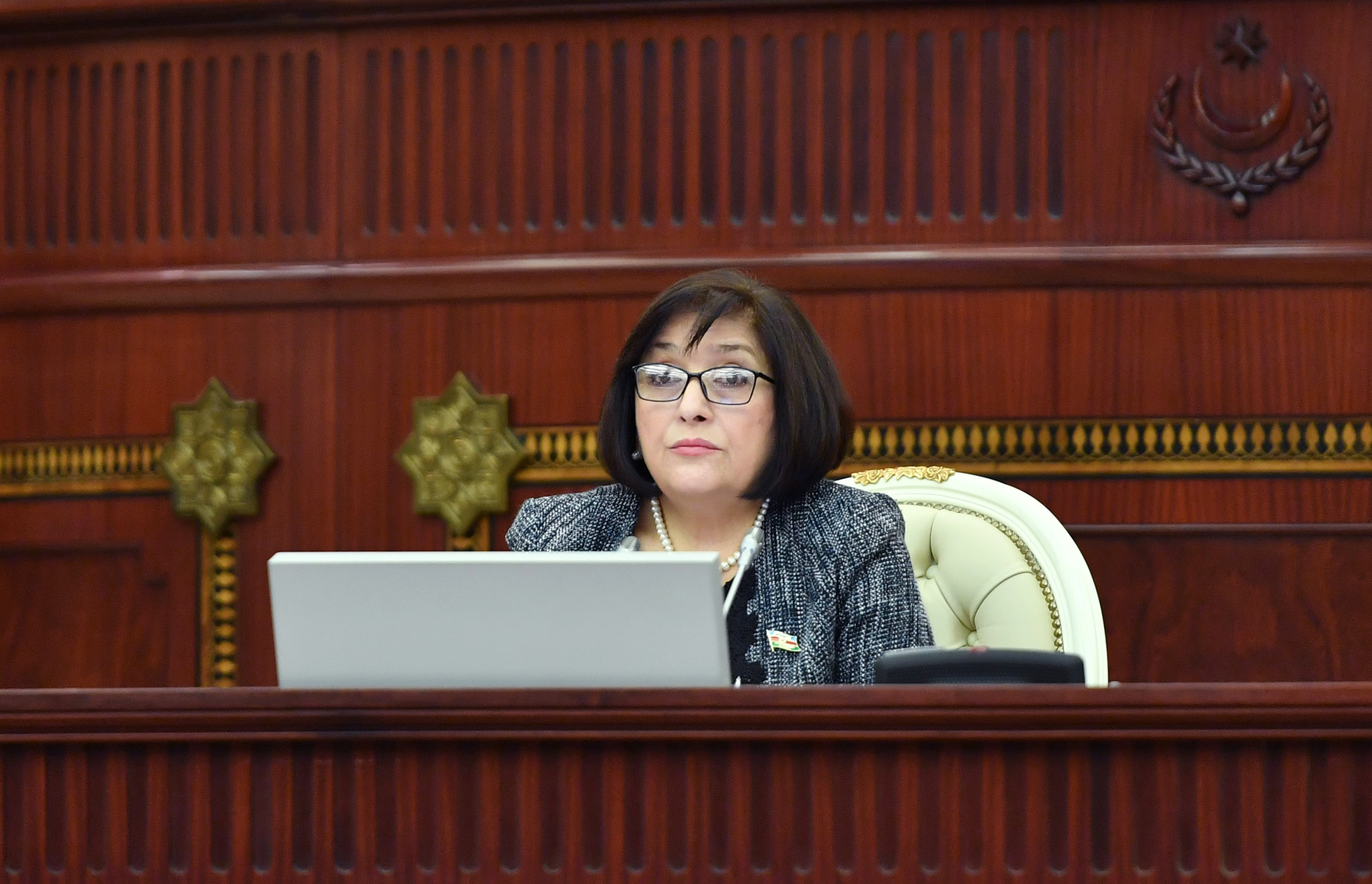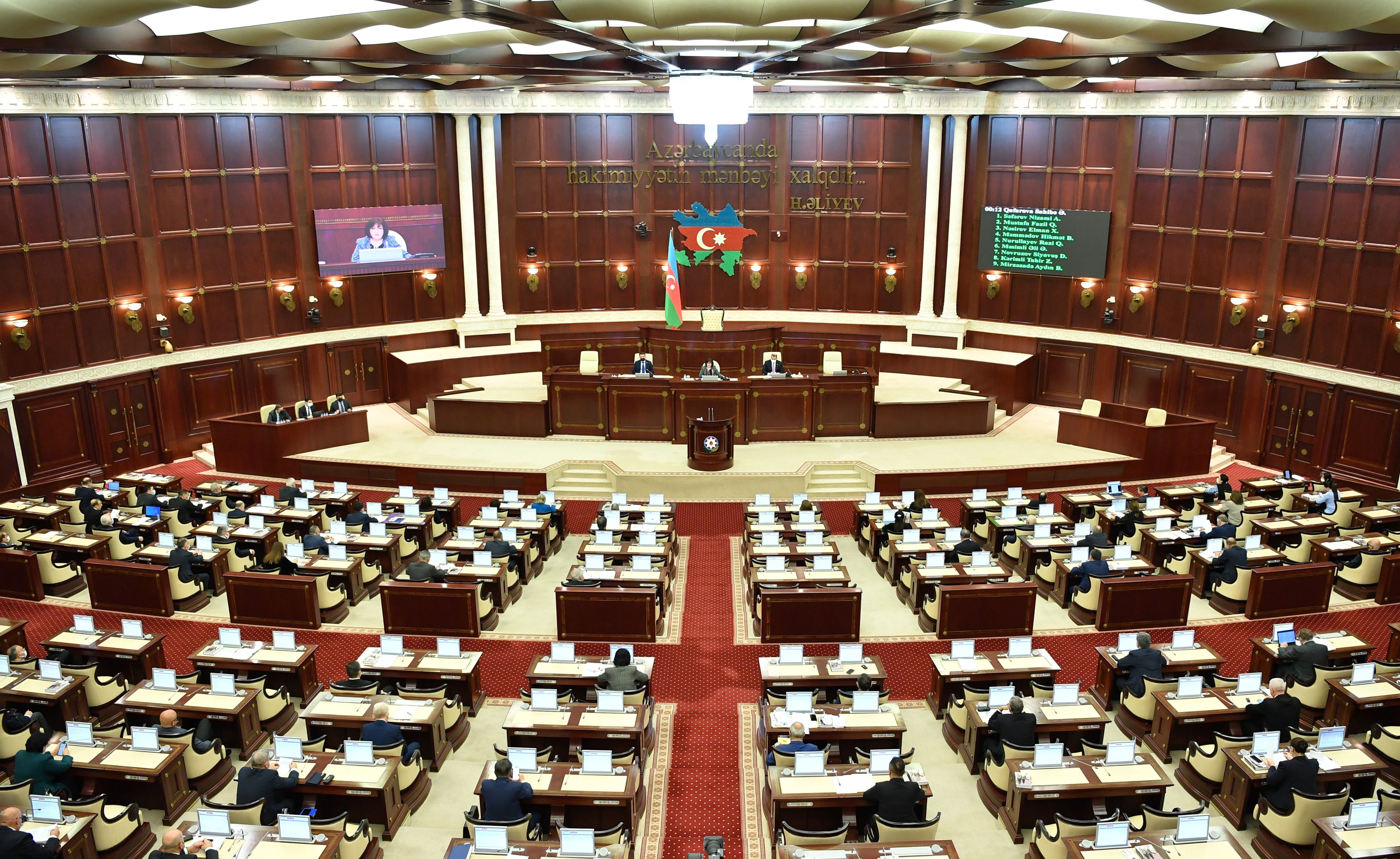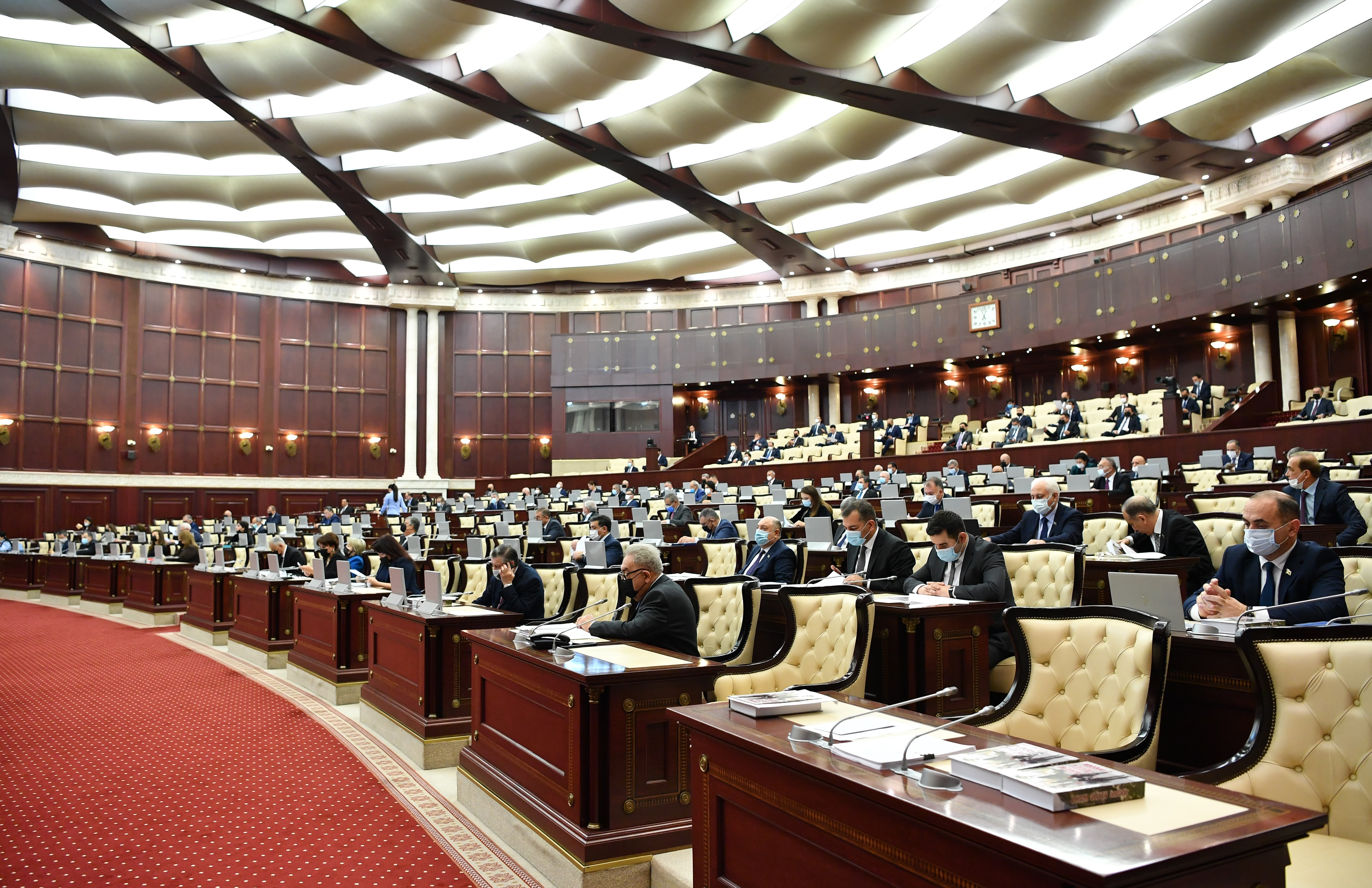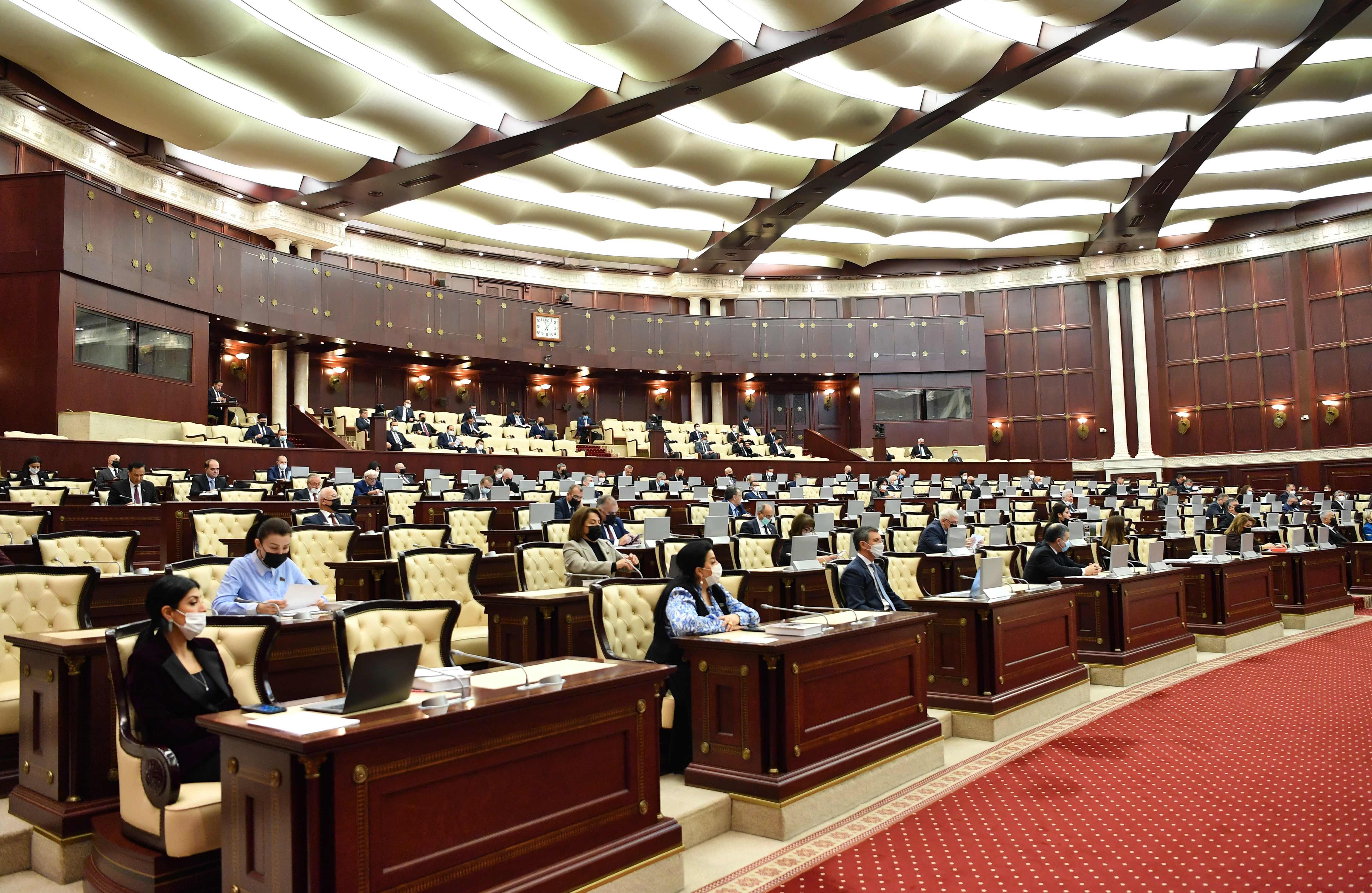At the Scheduled Plenary Sitting of the Milli Majlis
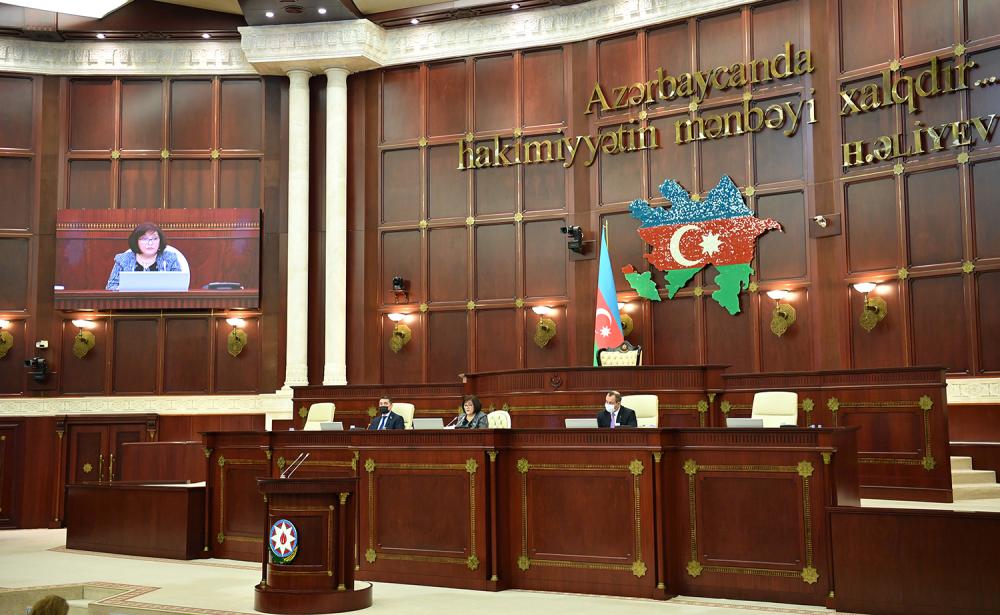
The Milli Majlis had a meeting in plenary according to the autumn-session schedule on 14 December.
Chair of the Milli Majlis Sahiba Gafarova began the sitting by informing the assembly of the working visit of the Azerbaijani parliamentary delegation to Istanbul on 8-10 December, undertaken to join the 16th conference of the Parliamentary Union of the Organisation of Islamic Co-operation hosted by the Grand National Assembly of Turkey.
The conference themed ‘Sharing, Conscience and the Islam: Palestine, Migration and Afghanistan’ took place on 10 December with the participation of President of the Republic of Turkey Recep Tayyip Erdogan. The introductory notes were made by the GNAT Chairman Mr Mustafa Şentop who once again congratulated Azerbaijan on the victory in the Patriotic War, Mrs Gafarova told the House.
The attending parliament chairs spoke at the conference then and so did Mrs Gafarova who told the audience of Azerbaijan’s achievements in furthering bilateral and multilateral co-operation with the Muslim states, fostering a stronger Islamic solidarity and supporting Muslim states under the roves of international organisations.
Islamophobia is one of the most serious threats in the world today; stronger solidarity, dialogue and co-operation were needed in dealing with the problems that the Islamic World is facing, Madame Chair was saying to her audience in Istanbul.
She also stated our state’s viewpoints regarding settlement of the Palestinian-Israeli conflict and restoration of peace and stability in Afghanistan.
As she spoke about the migration and refugees problems, Sahiba Gafarova remarked that the international community should look at the migration problem from a wider perspective and deal with its root causes so that it can be terminated. Azerbaijan, too, had been facing the problem of forced migration for long years. Armenia had kept under occupation almost 20 per cent of the territory of Azerbaijan for about 30 years. Armenia had carried out ethnic cleansing in these territories turning more than one million Azerbaijanis into refugees and internally displaced persons, Sahiba Gafarova told the House she had pointed out at the conference in Turkey.
The conference participants were told also that Armenia had deliberately wiped out all our cities and villages, and vandalised all historical, cultural and religious sites of Azerbaijan during the occupation. In total disrespect and hatred to all the Muslims, Armenia has destroyed and desecrated our mosques and used them as stables for pigs and cows. 65 out of 67 mosques situated in the formerly occupied lands had been destroyed, and the two remaining had been seriously damaged. Even all the graveyards in those territories had been vandalised.
The 44-day Patriotic War that had started as a result of Armenia’s military provocations had culminated in the complete victory of Azerbaijan and the signing of a capitulation act by Armenia on 10 November 2020. Azerbaijan had itself implemented the UN Security Council resolutions, norms and principles of international law, and had restored its territorial integrity and historical justice, too, Sahiba Gafarova was saying in her speech in Istanbul.
Concluding her remarks, the speaker of the Milli Majlis gave an outline of the current and continuing large-scale restoration lands afoot in the liberated lands to allow more than a million of our citizens to get back home. Signing a peace treaty between Armenia and Azerbaijan on the basis of mutual sovereignty and territorial integrity recognition as well as delimitation and demarcation of the borders will result in normalised relations and resumption of communications in the region. But Armenia ought to stop violating its obligations and refrain from actions that will aggravate the situation and damage prospects for peace and stability in the region.
The Speaker of the Milli Majlis told the legislators that she had also had a meeting with Chairman of the Grand National Assembly of turkey Mustafa Şentop whilst in Istanbul. They had exchanged opinions about Azerbaijan’s victory in the Patriotic War, restoring and rebuilding the de-occupied lands, opening the Zangazur Corridor and, thusly, generating new opportunities in the region with the subsequent (and consequent) benevolent effects on all the Turkic states. They had also exchanged views on the global anti-COVID-19 action and other matters. It had been pointed out in the course of their conversation that the Turkish chairmanship of the Parliamentary Union of the Organisation of Islamic Co-operation was going to create a new momentum behind the activities of this entity.
Back at the plenum, Sahiba Gafarova said that the visit to Istanbul had been a success; she thanked all the members of the delegation.
The issues du jour were turned to then. A number of them were covered by the parliamentary committee chairs Zahid Oruj and Ganira Pashayeva. Commentaries on a number of currently relevant matters also came from the MPs Nizami Safarov, Elshan Musayev, Fazil Mustafa, Elman Nasirov, Tural Ganjaliyev, Razi Nurullayev, Bahrouz Maharramov and Ali Masimli.
Next, the House moved on to the 17-item agenda that Chair Sahiba Gafarova announced.
The first relation was by First Deputy Chair of the Milli Majlis, Chairman of the parliament’s Law Policy and State-Building Committee Ali Huseynli. It was about the Bill ‘On Abrogating the Law of the Azerbaijan Republic “On the Special-Opinion Approval of the Agreement of Co-operation in the Prevention of Offences Consisting in Encroachment upon Intellectual Property and on joining “The Agreement of Co-operation in the Legal Protection and Defence of Intellectual Property and of Establishing the Inter-State Council on the Legal Protection and Defence of Intellectual Property” c/w the Amending Protocol to “The Agreement of Co-operation in the Legal Protection and Defence of Intellectual Property and of Establishing the Inter-State Council on the Legal Protection and Defence of Intellectual Property” dated 19 November 2010’.
The aforementioned agreement had been discussed in every detail and aspect at the joint meeting of the parliamentary committees for Law Policy and State-Building, and for International and Inter-Parliamentary Relations. Pursuant to the conditions put forth in connexion with that agreement, the Azerbaijani side shall not apply the latter’s stipulations and articles to Armenia until such time as a certain conflict is resolved conclusively and the Azerbaijani-Armenian relations are normalised. Besides, Ali Huseynli mentioned, the document in question envisages the institution of a local collaboration body and the parties to the agreement are to incept the Inter-State Council on the Legal Protection and Defence of Intellectual Property, which, in turn, shall act in compliance with its Charter. Another issue is the agreement’s discontinuation in 1998.
The Bill was put on vote and adopted in one reading only.
Ali Huseynli then tabled the third reading of the amendments to the Law ‘On the Institution of the Orders and Medals of the Azerbaijan Republic’ in view of the institution of the jubilee medal ‘The Centenary (1921-2021) of the Azerbaijan State Paedagogics University’. Mr Huseynli recalled the laudations of the place of the ASPU in the national education system that had sounded during the first and second readings, and described the Bill as homage to the university that was due to celebrate its centenary in a few days.
That document was adopted in the third reading.
After that, the House looked at the third reading of the amendments to the Law ‘On the Institution of the Orders and Medals of the Azerbaijan Republic’ connected with the institution of the jubilee medal ‘The 15th anniversary (2005-2020) of the Defence Industry Ministry of the Azerbaijan Republic’, too, tabled by First Deputy Speaker who mentioned the home-front workers’ contribution to the Victory in the Patriotic War and called on the colleagues to vote on the document.
That Bill, too, was approved in the third reading.
Ali Huseynli next informed the House of the second-reading Bill ‘On the Repeal of the Laws of the Azerbaijan Republic “On the Personal Identification Document of the Citizen of the Azerbaijan Republic”, “On Amending the Law “On Amending the Law “On the Residency and Factual Abode Registration””, “On Amending the Law of the Azerbaijan Republic “On the “On the State Population Register of the Azerbaijan Republic”” (adopted on the force of the Law of the Azerbaijan Republic No 782 dated 8 February 1994”, “On Amending the Law of the Azerbaijan Republic “On the Citizenship of the Azerbaijan Republic”, “on Amending the Family Code of the Azerbaijan Republic” and “On Amending the Certain Laws of the Azerbaijan Republic in Connexion with the Validity Term of the Personal Identity Card of the Citizen of the Azerbaijan Republic aged below 15”’.
According to Mr Huseynli, the application of the individual identification card in the case of the citizens of the Azerbaijan Republic under the age of 15 is redundant considering that the citizens of the republic under the age of 15 have been given the new-generation IDs bearing the data identical to those carried by the individual identity cards since 1 September 2018. Therefore, the Bill at issue envisages the repeal of the law on ‘the personal identity card of the citizen of the Azerbaijan Republic under the age of 15’ as well as several other laws concerned with the same subject-matter.
The Bill was adopted in the second reading subsequently.
Going further, Ali Huseynli summarised the second-reading Bill containing amendments to the Code of Administrative Offences. The amendments, he explained, had been drawn up to guarantee redress for a violation of employee rights committed in the context of labour relations whilst also motivating employers restore such usurped rights rather than opt for paying the applicable fines and, last but not least, to boost the operating efficiency of the State Labour Inspection under the auspices of the Ministry of Labour and Social Protection of the Population. No proposals had been made during the deliberations, according to Mr Huseynli.
The Bill was adopted in the second reading.
Arzu Naghiyev of the Defence, Security and Counter-Corruption Committee then gave an overview of the second reading of the amendments to the Intelligence and Counter-Intelligence Law. MP Naghiyev mentioned that the law-makers had been supplied with ample information about the document at the first reading. Their opinions and conclusions had been reflected in the version of the document being tabled now, MP Naghiyev added.
It follows from this Bill that 5 per cent of the fees payable to the State Budget in connexion with criminal cases investigated by the State Security Service would be spent on improvement of the SSS personnel’s social protection.
That Bill, too, was passed in the second reading.
Following that, Chair of the Culture Committee Ganira Pashayeva came up with the second reading of the amendments to the Copyright and the Neighbouring Rights Law. Mrs Pashayeva told the House that a number of important considerations had been put forth at the first reading but no proposals or claims regarding the document had come out.
The amendments have it that control over the organisations dealing with copyrights and neighbouring rights as well as over their activities’ compliance with the law in question will be the responsibility of an entity established by the appropriate executive authority body.
The Bill was adopted in the second reading.
Next, Ali Huseynli tabled in the second reading the amendments to the Courts and Judges Law. Thereby, Mr Huseynli explained, it was proposed to take into account lawyer’s length of service in the state authorities as well as their academic or teaching track records in the same specialisation with their inclusion of the judge’s track record. This proposal concerns those persons who conform to the requirements of Part I Article 126 of the Constitution, command reputation in the legal field, have served as lawyers for 20 years or more and possess high moral qualities when such persons are appointed as judges by special proceedings and in procedural compliance with the provisions of Article 93-4 of the law in question.
The Bill was approved in the second reading.
Chair of the Parliament Sahiba Gafarova told the House that the next nine items on the agenda were the Bills coming up in the first reading. The next two, incidentally, had arrived at the Milli Majlis in one letter from the President of the Republic, Chair Gafarova added.
Chairman of the Labour and Social Protection Committee Musa Guliyev gave a thorough overview of the Tourism Bill (the first reading).
The currently-effective Tourism Law was enacted in 1999 and is no longer adequate to the rapid growth of the tourism sector; nor is it adequate for legal resolution of new challenges and the problems present in this sector, hence the new Bill, intended to ensure the industry’s sustained development. The new document affords a mechanism whereby the tourism industry would be regulated as well as a set of rules to ensure efficient employment of the tourism resources.
The new law will contain of 5 chapters and 22 articles. Chapter I contains the general provisions and notions; it determines the forms and kinds of tourism whilst also drawing its legislative frameworks. It also sets the boundaries of the law’s application. Chapter II is about the main areas of the relevant state policy and agenda.
Chapter III, dedicated to the regulation mechanism, encompasses raising the quality of services, organisational and legal regulation of tour operators and travel agencies, hotels and institutions of the equalised status, guides and tourism associations. The same chapter also deals with the ethics of conduct code. It follows from the appropriate article of the document that the state tourism body is to establish a Register of Tourism in order to gather information about the tourism industry subjects. Such data will be stored, used and checked for accuracy, completeness and reliability; they will also underlie development of the star categories and rating scales for the industry operators. Other activities are envisaged as well. The Register is to be kept electronically. In addition, the Bill has the articles about the rights and obligations of tourists, travel visas and e-visas issued to tourists, and the legal regulation of tourist security and insurance.
Chapter IV lays down the general terms and conditions pertaining to employment of tourism resources; it also contains the provisions applicable to tourist and recreation areas. Chapter V is about funding sources for the industry, penalties for violation of the law and its requirements, and the procedure of putting the law into force.
According to the committee chairman, the enactment of the new law will give the tourism in our country a jolt in every fine sense.
Comments came from the committee chairs Siyavush Novruzov and Ganira Pashayeva. Considerations, remarks and proposals were also put forth by the MPs Mazahir Panahov, Razi Nurullayev, Ali Masimli, Mushfig Jafarov, Fazil Mustafa, Mahir Abbaszade, Rauf Aliyev, Shahin Ismayilov, Hikmat Mammadov and Aghil Abbas.
Chairman of the State Tourism Agency Fuad Naghiyev who was present at the plenary sitting responded to the commentaries, answered the MPs’ questions and shed light on a number of issues pinpointed by them.
In the end, the assembly voted for the Bill to be passed in the first reading.
A break was announced then.
As the sitting was resumed, Item 10 on the agenda was tabled: the set of amendments to the Code of Administrative Offences was tabled by Kamal Jafarov of the Law Policy and State-Building Committee. Those amendments, he said, were connected to the Tourism Bill and defined the new administrative offences that would consist in breaching the norms defined in that Bill.
The Bill was approved in the first reading.
A member of the Economic Policy, Industries and Enterprising Committee Mahir Abbaszade introduced the MPs to the draft amendments (in the first reading) to the Budgetary System Law, saying that they had been drawn up to streamline the budget procedure so that the budgeting process would be based on the parameters of the non-oil underlying fiscal deficit to the non-oil GDP and the total state debt to the GDP ratios. Those parameters are being offered in order that a ceiling can be drawn for the forthcoming transfer from the State Oil Fund to the State Budget and that the state debt would be prevented from growing further.
Besides, the Bill contains a number of adjustments and refinements. Certain notions are reworked and offered in the new edition; the scope of the documents submitted together with the State Budget Bill is concretised. Certain other necessary corrections have been made, too.
Mahir Abbaszade gave the House explanations about the first-reading amendments to the State Debt Law, which, he pointed out, were designed to concretise the status of the Liabilities Liquidation Fund with respect to the state debt and state guarantees, and to set the ceiling for the LLF expenditures.
As per one addendum to the law, should payments in settlement of the principal amount of the state debt be deducted from the state loan borrowed during a current budgeting year, then, that portion of the said payments that exceeds the projected annual state debt servicing expenses of the State Budget shall not be posted to the SB expenses. The other addenda limit the LLF spending to the sum of its financial balance as at the beginning of the fiscal year coupled with the incomings forecast for the same year.
The committee chairman Siyavush Novruzov and MP Ziyad Samadzade shared their thoughts about the aforementioned amendments after which both Bills were voted through the first reading one by one.
Anar Mammadov of the Economic Policy, Industries and Enterprising Committee came up with the next two agenda items, which he said were interconnected. MP Mammadov began with the first reading of the amendments to the Tax Code, saying that they envisaged a five-year VAT exemption for equipment of all kinds used to purge the de-occupied provinces of mines and unexploded ammunition left from the war. Second, the first-reading amendments to the Customs Code envisage a five-year exemption from the customs duties of, again, equipment of all kinds used for the same purpose in the same provinces.
Both Bills were voted for in the first reading after the House had listened to the relevant ideas of MP Fazil Mustafa.
Further, Chairman of the Labour and Social Policy Committee Musa Guliyev tabled the next item on the agenda. First, MP Guliyev informed the assembly of the draft amendments (in the first reading) to the Unemployment Insurance Law, drawn up, he said, in fulfilment of the presidential decree No 1233 dated 30 December 2020 ‘On Application of the Law of the Azerbaijan Republic No 235-VIQ dated 29 December 2020 “On the 2021 Budget of the Unemployment Insurance Fund”’.
The draft contains the new provisions designed to enlarge the coverage of the persons on the unemployment dole, reduce the length of employment required under termed labour contracts and cancel the three-month insurance compensation waiting time. Besides, the law would widen the entitlement to the insurance compensations and would also reduce to 30 months the terms of the labour contracts concluded within the compulsory minimal 36-month period that begins upon expiry of the previous labour contracts. The insurance compensations would be paid immediately upon the occurrence of the insured cases and not three months thereupon.
Having said all that, Musa Guliyev presented to the House the first reading of the amendments to the Employment Law. He told them that it was proposed to adjust Article 20.2 for a better legal status of the persons in search of employment and being in possession of arable land plots. In addition, the amendments would broaden the category of persons put on vocational training and, ultimately, would make it easier for them to find employment. At the same time, it is proposed to entitle to the gratis vocational training those job-seekers who possess arable land but have no other engagements.
The amendments to Article 21 envisage engagement of unemployment persons in paid public works alongside with job-seekers on condition that the jobless would not constitute more than 20 per cent of the total number of persons engaged for paid public works. The same amendments to Article 21 stipulate granting the persons owning arable land but unengaged otherwise the right of involvement in active employment arrangements.
As deliberations followed, the MPs Ali Masimli, Elshad Mirbashir oglu, Sabir Rustamkhanli and Etibar Guliyev spoke of the importance of the amendments. The added state support measures are of exceptional significance in terms of keeping the public welfare intact, in their opinion.
The Bills in question were voted through the first reading separately.
Chair of the Milli Majlis Sahiba Gafarova announced next that the last item on the agenda was the Media Bill. Mrs Gafarova underlined the substantial role that the institute of the media play in the development of any country and any society. Naturally, she continued, democratic states take great care to foster the media. In Azerbaijan, too, the media are embraced with robust state care and have covered a great path of progress over the past years. One can safely say, according to Chair Gafarova, that the Azerbaijani media fulfil their mission commendably in the main and are making their own special contribution to the development of our country. Especially commendable are the examples of patriotism and professionalism that the national media set during the 44 days’ Patriotic War. It is known very well, according to Sahiba Gafarova, that Azerbaijan led by the esteemed President and Commander-in-Chief Ilham Aliyev had achieved splendid victories both in the battles of the Patriotic War and in the information field. The president of the country was giving daily interviews to overseas media: that made an unparalleled input in boosting the international awareness of the true state of affairs then. Our media, too, had their own share in the big victory in the information warfare. As regards the new law, its enactment will bring our media additional development opportunities while the state support that they already enjoy will only become stronger.
Following Mrs Gafarova’s introduction, Chairman of the Human Rights Committee Zahid Oruj informed the House of the Media Bill being tabled in the first reading. According to Mr Oruj, the Bill is being presented to the law-makers after an extensive discussion at the joint meeting of two parliamentary committees with the participation of the leaders and representatives of more than 50 media. The new law will provide a powerful foundation for addressing all the technical, organisational, social and professional problems of the media; further steps by the State to promote the media are anticipated within the coming few months. Our State is interested to see the media advance and grow stronger.
The Bill consists of 9 chapters and 78 articles. Chapter I details the scope of application of the law; besides, it is written in it that the new law will apply to the media incepted within the territory of the Azerbaijan Republic and their editorial offices and products as well as to those media and journalists that are based abroad but whose operations are concerned with our country and, third and last, only those parts of overseas media that will be circulated and broadcast in the country.
The draft law contains a precise list of media – the print and online ones, the audio-visual and the news agencies – that constitute the general area to be governed by the future law. The list of requirements for any organisation to be viewed and treated as a media is one of the crucial components of the draft law. There is the requirement that should the founder of any media be a physical person, he/she shall have the Azerbaijani citizenship and live in the Azerbaijan Republic permanently whereas a corporate founder shall have a 75% majority stake in its charter capital in possession of either a physical person who is a permanent resident of the country or is a legal person registered in it.
According to the committee chairman, another key postulation in the Bill is that there will be a register of media, to be maintained by a centralised entity. On the one hand, this will give rise to a centralised database and an undistorted history of the national media. On the other, such an arrangement will introduce the legal nature of the relations in the industry whilst also guaranteeing various social, economic or other privileges and, at the same time, promoting a transition from formal registration to a more dependable register system and, last but not least, issuing the media with the appropriate certificates of registration. Hence the stipulation that the in-registry journalists should be issued with the relevant cards, the criteria for the issuance of which are entirely in line with the relevant international principles. Besides, the Bill brings more provisions regarding free journalism and those provisions’ scope is larger than before.
First Deputy Chair of the Milli Majlis/Chairman of the Law Policy and State-Building Committee Ali Huseynli made several comments on the Bill. He mentioned its impeccable drafting and the observance of the pertaining requirements of the Constitution of the Azerbaijan Republic and the European Convention on Human Rights alike. Mr Huseynli mentioned the certain limitations indicated in the Bill but emphasised just how broad the rights it would grant were at the same time. This subject is in the focus of the parliamentary leadership, Mr Huseynli remarked before talking about the importance of discussing the document together with the media people in a yet larger format. The goal is ultimately to protect the rights of the media people who demonstrated true statehood mentality and patriotism both during the Patriotic War and after it – including the protection of their rights by means of this new law.
Deliberations began. The committee chairmen Siyavush Novruzov and Tahir Rzayev, the MPs Hikmat Mammadov, Elman Nasirov, Azay Guliyev, Tural Ganjaliyev, Fazil Mustafa, Vahid Ahmadov, Javid Osmanov, Malahat Ibrahimghizi, Azer Badamov, Sahib Aliyev, Erkin Gadirli and Nigyar Arpadarai talked about the significance of the Bill. They also made comments and suggestions regarding it.
The Bill was voted for adoption in the first reading, which marked the end of today’s sitting of the Milli Majlis.
The Press and Public Relations Department
The Milli Majlis



